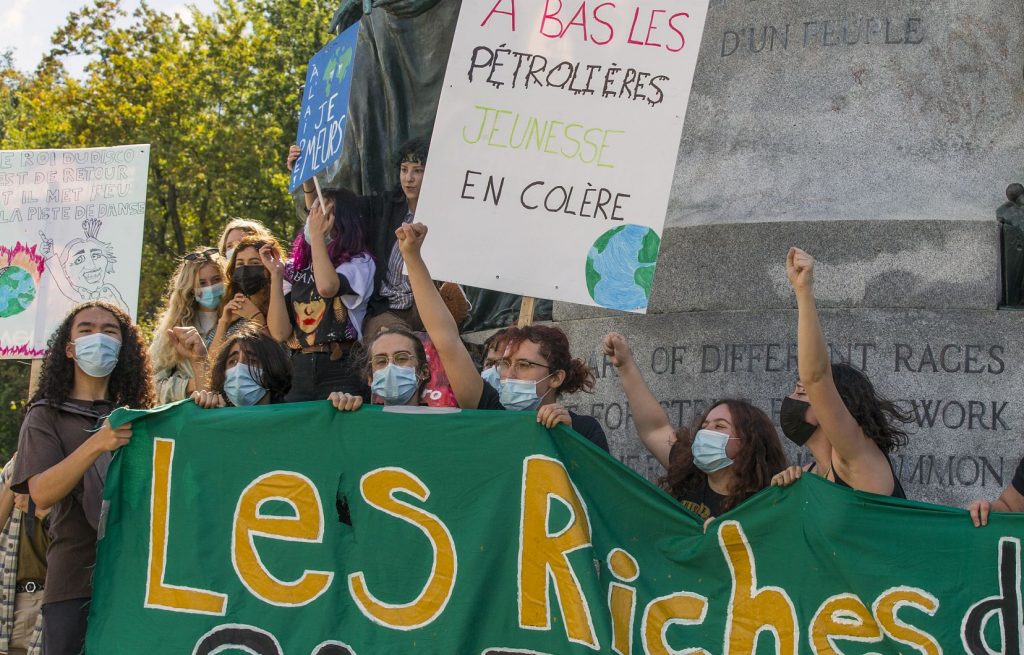Despite somewhat gloomy weather in some areas, thousands of Quebecers, mostly young people, demonstrated Friday to demand more ambition in the fight against the climate crisis, nearly six years after the Paris Agreement was signed.
These demonstrations, which are part of the international movement of student strikes for climate launched by young activist Greta Thunberg, are taking place in a dozen cities, including Montreal, Quebec, Sherbrooke, Gatineau, Alma, Rimouski, Granby and Juliette. Just over 112,000 students voted on Friday’s strike to take part in this mobilization for “climate justice.”
In Montreal, the demonstration took off at the beginning of the afternoon near the monument to Sir Georges-Etienne Cartier, at the foot of Mount Royal, the same starting point for the majestic demonstration that gathered around 500,000 people in September 2019.
“Today’s protests and strikes are the start of a new chapter of mobilization for climate justice after the harsh impact of COVID-19 on the movement,” he said. Should Albert Lalonde, member of the Student Alliance for Environmental and Social Transformation (CEVES).
“Now that the population has been massively vaccinated, we must not forget how the most vulnerable people have been disproportionately affected by the epidemic and are still the hardest hit by crises, including climate crises. What we need more than ever is a real social project where resistance includes Climate fight inequality and social injustice,” adds Mr. Lalonde.
“Without a formal strike crowd as in 2019, I find it impressive to note that more than 112,000 students have spontaneously gone on strike for the climate in just two or three weeks,” says Luca Salas, CEVES speech co-author.
According to him, the fall of 2021 will be marked by pivotal moments in the fight against the climate crisis, including the upcoming United Nations Climate Meeting (COP26), during which countries should in theory increase their climate ambition. The goals of the Paris Agreement and the mitigation of climate change.
political support
Elected officials from all parties represented in the Quebec National Assembly must participate in one or more of the events scheduled for Friday.
Presenting at a demonstration in Montreal, the environment spokesperson for the Liberal Party of Quebec, Isabel Melanson, states that “scientists are in agreement”: “There is an urgent need for action. It is no longer the time to move. It is time for action. According to her, Quebec should adopt a bill “on carbon neutrality by 2050” and “abandon all forms of oil and gas exploitation,” as suggested by the liberals.
For Solidarity member Emilys Lessard Terrain, “Young people are right to worry.” “Everyone should be concerned. If we do nothing, disaster awaits us and we will never risk not being able to experience the world we once knew.” The climate crisis is disrupting our seasons, spoiling our standards, and upsetting our quality of life and the quality of biodiversity. The climate crisis must be addressed with the same urgency as the health crisis. “
For Parti Québécois leader Paul St-Pierre Plamondon, fighting the climate crisis requires the independence of Quebec. “Making a country is getting out of Petroleum Canada to ensure our taxes are used to bring about a shift toward a green economy and not to fatten Alberta’s oil companies,” he argues.
The Minister for the Environment and Combating Climate Change, Benoit Charette, will not attend along with the protesters on Friday. “The minister has other obligations during the event,” his cabinet confirmed Thursday in a written response. Should. The presence of Parliamentary Assistant to the Minister of “Climate Change” Richard Campo was identified.
Required change
After two years of impressive climate mobilization in Quebec, Équiterre’s CEO, Colin Thorpe, believes that political action is still not up to the task.
But she says environmental mobilization is on track to resume after being set aside for several months due to the pandemic. “The desire for change and the thirst for justice has not subsided. We have governments, at various levels, constantly blowing on these embers with actions that do not amount at all to this great crisis. That is why I am convinced that the fires of mobilization will resume.”
For Greenpeace spokesman Patrick Boonen, signs of the climate emergency are more visible than ever, and the policy response must now be up to the task. Wildfires, deadly heat waves, and this significant global mobilization should signal the awakening of governments still asleep on gas. It is imperative that they listen to residents and propose ambitious climate goals and plans that respect science, free themselves from hydrocarbons, and ensure a just and safe transition for communities and ecosystems. “
Towards an “unrecognizable” world
For two years, climate science has clarified its predictions for decades to come, if humanity fails to significantly reduce greenhouse gas (GHG) emissions.
In a report published in August, the Intergovernmental Panel on Climate Change (IPCC) found that while greenhouse gas emissions had stabilized and then declined over the next few decades, the average rise in temperatures compared to the pre-industrial era could be as much as 2°C. Within twenty years, then nearly 3°C by the turn of the century.
Si ce dernier scénario se confirmait, le GIEC prévient que le monde tel qu’on le connaît deviendrait carrément “méconnaissable”, avec unrecul de l’espérance de vie” et “un recul de la vieur” de qualités de qualités de planet. Thus the ‘health and well-being’ of the population will be ‘significantly reduced’ and this condition will continue to deteriorate over the following decades.
The Intergovernmental Panel on Climate Change also warns of a “significant” increase in food prices, conflict and climate migration. According to a report released last week by the World Bank, the climate crisis is expected to force more than 200 million people to leave their region or country by 2050.
However, six years after the signing of the Paris Agreement, countries are still far from doing what is necessary to reduce greenhouse gas emissions. In fact, there is no doubt that emissions are stable at present, even less than declining, but there is an increase in the next few years. Calculating the voluntary commitments of countries, the United Nations estimated last week that emissions are on course to increase by 16% by 2030, compared to their level in 2010, when they are expected to decline by at least 50%. This leads us to a minimum temperature rise of 2.7°C, while we have already reached 1.1°C.
Watch the video

“Music guru. Incurable web practitioner. Thinker. Lifelong zombie junkie. Tv buff. Typical organizer. Evil beer scholar.”







More Stories
Why do leafhoppers reflect little light?
Bacteria brought into space mutated and became stronger on board the International Space Station, study finds
Sperm for science used in fertilization: already 16 contacts